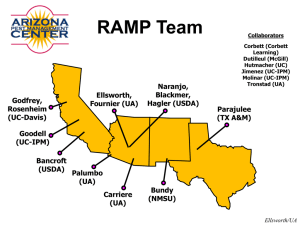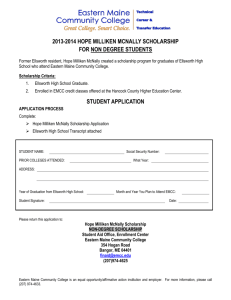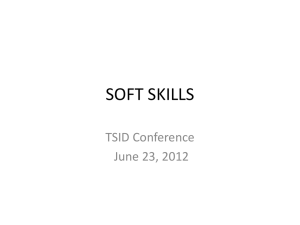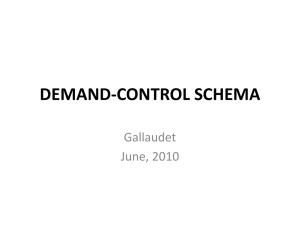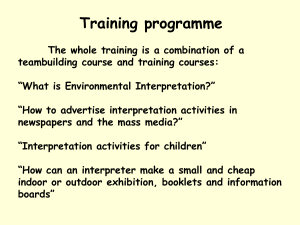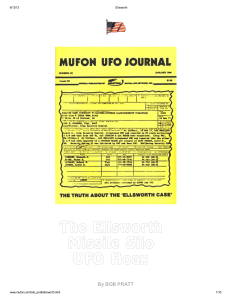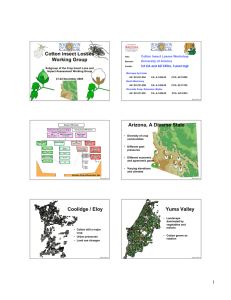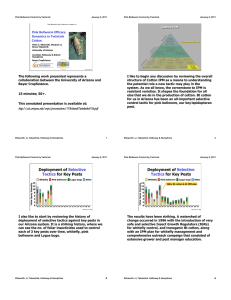Report Example D. HOY - Ohio School for the Deaf
advertisement
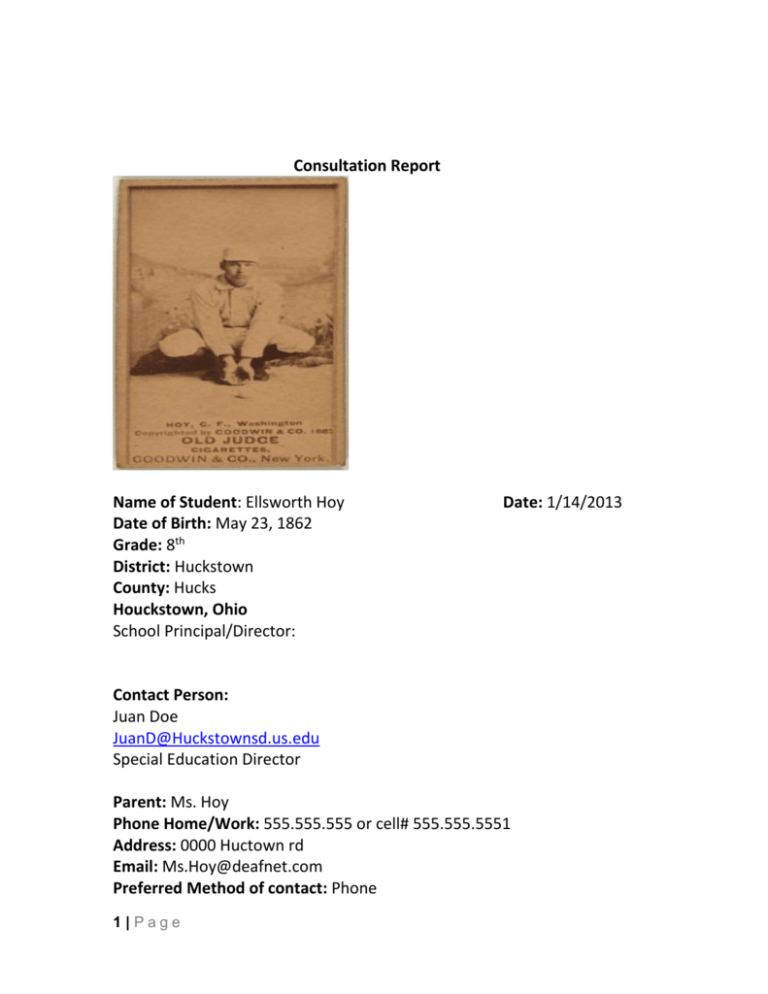
Consultation Report Name of Student: Ellsworth Hoy Date of Birth: May 23, 1862 Grade: 8th District: Huckstown County: Hucks Houckstown, Ohio School Principal/Director: Date: 1/14/2013 Contact Person: Juan Doe JuanD@Huckstownsd.us.edu Special Education Director Parent: Ms. Hoy Phone Home/Work: 555.555.555 or cell# 555.555.5551 Address: 0000 Huctown rd Email: Ms.Hoy@deafnet.com Preferred Method of contact: Phone 1|Page Consultant: C. Crane Date of Consultation: January 1st Reason for Consultation: Team support and transition concerns Staff Concerns: Attention and understanding of instruction. Concentration and focus in working. Disaffection and social maturity Background Information: Ellsworth is in his home district and with the exception of an early childhood program has been mainstreamed in his home district his entire academic career. Health: No reported concerns and no concerns around absences. Ellsworth had a progressive loss early and was fitted with bilateral aids. Cochlear implantation on right ear by age three. Assistive Technology: Advanced Bionics CI right ear. Hearing worn on left ear. Consistent teacher use of the FM. Interpreter provided for all classes using SEE (Signed Exact English) Classroom Environment: The school building is an older one with hard floors and a challenging listening environment with few modifications to reduce ambient noise. Ellsworth has access to both visual and auditory communication for instruction and class discussions. He has good seating, in a place where close to the teacher and Ellsworth can see the class well. 2|Page Communication Observations: Receptive: Ellsworth continues to rely strongly on the interpreter (Signed Exact English 2) for receptive communication and understanding of instruction. He uses the interpreter for both receiving direct instruction and clarification. Expressive: Ellsworth uses spoken English almost exclusively for expressive communication, although his speech is hampered by some issues with clarity and fluidity. Does not slow down for precision. Speech: Working on figurative language and productive S blends. Ellsworth is able to rely on his intelligence to negotiate social and learning situations. Slowing down for production is a must for precision in productive speech. Educational Learning Narrative: General Observations: Works at a very slow pace Interpreter Use: Clearly misses some information and checks in with terp for notes, class instruction, and movies captioned (poorly Schedule: Science Math Int. Study Hall U.S. History Channel 1: Did not observe PE: Did not observe Language Arts: Need to Observe on a different day Science Class: Recently transferred into class due to learning Challenges with last class Working independently on vocabulary: Works in a focused manner 3|Page Math: White board work with interventionist support. Reviews homework the board with student input. Ellsworth volunteers answers and Ellsworth’s answers are correct In class quiz he works slowly but with focus.. Study Hall/Speech: Student well behind Language Arts: reworking late assignment History: Ellsworth enjoys this subject and teacher reports that he is doing well no concerns. B plus Difficult listening environment Observed challenges with new vocabulary Notes given /Good attention Good FM self management ASL CLASS!!! INTERVENTION STRATAGIES FOR BULLYING Issues around social isolation and deafness Integration through ASL class Receptive understanding a real issue Productive language Teachers report issues with intelligibility, self management and maturity Good use of FM’s in the classroom Watches terp for 100 percent of student’s comments even with the pass around mic English: Using McDougal Littell Vocabulary and Spelling Book/Grammar Usage and Mechanics Book…… Struggling in language needs more support in English Call TOD not seeing him weekly… How is remediation being handled Outside tutoring may be a must Johnny Strange Bullying issues Channel 12:15 4|Page Ellsworth’s resource teacher and his education team works hard to ensure the accessibility of instruction and communication through the following supports: Skilled licensed interpreter, FM system, re-teaching and extra time when needed. Ellsworth uses the interpreter often for clarification and instructional support. He has some real issues staying focused on both instruction and independent work. The real challenge for him (as with most deaf children) is his inability to passively receive information “listen”. If he is not looking at the speaker (interpreter) he is not able to receive instruction or communication. However, it is important to note that his language delays coupled with the observed and reported “distractibility issue” creates for a very challenging situation for him to be successful in a fast passed mainstream placement. He volunteers opinions in class but does not volunteer the answer or respond to questions regarding work. Overall he is a student that requires extra time, slower paced visual instruction that and receptive communication facilitated by a sign language interpreter. Social Emotional Observations: Ellsworth seems well liked and fits in well with his peers. He communicates with his peers using different strategies: expressively he uses spoken English and receptively through a combination of limited hearing, speech reading, and conjecture based on context. While this would method would not serve him for instruction, he is able to do moderately well with his peers in social situations. Some staff report he is being bullied or ignored by other students. In class he interacts well with other students and is very outgoing and engaged with cohort. Although (like many deaf students) he does not understand many social conventions and is very literal in his understanding, he could benefit greatly by direct instruction using pragmatic language development and social etiquette/conventions. This 5|Page could be facilitated by his SLP working in conjunctions with his itinerate teacher of the deaf. Parent Mentor Comments: Parent referred but PM was not contacted for report. Tabitha Belhorn: 614.752.2647 Questions for the team to consider: Questions around intelligibility I would like to see data on productive speech such as on going assessments using ???? (see report Dayton) Pacing seems to continue to be a real issue for Ellsworth; with regards to his attention challenges, is he able to honestly keep up with the pace of a mainstream middle classroom without lots of support? Is this something classroom supports can easily solve? How should the team best address this issue? Bullying strategies still issue Social emotional ASL class on the books for next year As he is primarily a visual learner, he would benefit greatly from instruction using visual presentation of information with an overhead projector, smart board, (with printable notes) How best to reduce the gap in vocabulary and language delay: vocabulary, direct instruction in vocabulary and language through a team approach, pre-teach (interventionist), classroom, SLP, rigor and support at home or out of school tutoring. Lack of deaf or hard-of-hearing peers. Summer camps, parent driven social events, deaf video pen pals, School for the Deaf Events, A.G Bell events. High expectations: He needs to know that he is responsible for understanding and classroom rigor. 6|Page Recommendations: Staff Support: Providing instruction, accommodations and good communication for a student who is deaf or hard of hearing can be a challenging job for the teachers and support staff. I observed capable and committed teaching staff, without the specific training or understanding of the student’s particular challenges. I would encourage the team to add the consultation support of a Educational Audiologist or itinerant teacher of the deaf, in order to in-service staff in using access equipment and how best to serve the student using auditory access and visual support technology every school year. I would strongly encourage the team to consider adding the consultation support of the following professionals: An educational audiologist in order to support her equipment and use of the computer and FM. This could be done through the ESC. An itinerant teacher of the deaf, in order to support the staff on language development, ASL and direct curriculum support. This could be done through the ESC. Social Emotional Development: As stated Ellsworth would benefit greatly from direct instruction in vocabulary expansion, pragmatic language development, social etiquette/conventions and organizational skills. In my opinion this could best be facilitated by the Itinerate teacher of the deaf support, SLP, Interventionist and parents working in concert around his curriculum. Ellsworth like many deaf and hard-of-hearing students in the main stream, is challenged in making make deep connections with his 7|Page peers. This is due be to the difficulty he experiences around understanding everything that is being said and being understood by his peers and teachers. This is further exacerbated by the challenging listening environment of the classroom, lunch room or gym where many of the social interactions occur. The team should consider creating programming that would facilitate an organic positive social group for the student such as a leadership class or a Sign Language Class (special) that would facilitate social emotional growth, positive peer interactions and benefit the greater school community. (This could be facilitated by a contracted sign instructor or interpreter depending on district policies) Placement: Clearly the education team and parents have worked hard to ensure that all reasonable accommodations could be made for Ellsworth to have equal access to instruction and materials. I feel that the mainstream placement with the educational supports of an licensed interpreter, FM System (with Audiologist support) and key support personal such as an SLP and interventionist will assure that the success of the placement and respect the FAPE mandate. Instructional support: Due to Ellsworth’s language delays, an emphasis should be on vocabulary and pre-teaching in all of his subjects and vocabulary should be shared by all staff, home and managed and known by the interpreter. I encourage the team to keep in in mind the following considerations during instruction: Specialized seating arrangements for auditory teacher access and visual access to peers. Obtain student’s attention prior to speaking Reduce auditory distractions (background noise) Reduce visual distractions Enhance speech reading conditions (avoid hands in front of face, mustaches well-trimmed, no gum chewing) Present information in simple structured, sequential manner Clearly enunciate speech Allow extra time for processing information Repeat or rephrase information when necessary Frequently check for understanding 8|Page Communication: Due to a lack of clarity in Ellsworth’s speech the team should consider administering a Speech Evaluation for (understandability) on a yearly basis, set goals based on those results and chart his progress. Due to the student’s age and challenges in speech, Ellsworth’s parents may need to consider ongoing outside support for Ellsworth’s speech and auditory training through a private SLP,AVT or LSLS. Further, it would aid the student to have a formal communication plan (how best to support his expressive and receptive language) that all of the team and family understands and supports. . 9|Page
